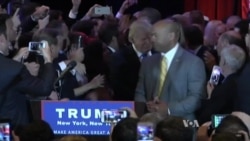After months of campaigning for their respective parties' U.S. presidential nominations, Republican Donald Trump and Democrat Hillary Clinton are very close to facing each other in the November national election.
In fact, one day after a series of convincing wins in Tuesday nominating contests, the two focused most of their attention on each other, rather than their rivals in the remaining contests leading up to the conventions.
The Republican front-runner on Wednesday accused Clinton of playing "the woman's card" in the race. "She's got nothing else going," Trump told supporters in New York. "Frankly, if Hillary Clinton were a man, I don't think she'd get 5 percent of the vote."
Clinton responded at an appearance in Philadelphia that "if fighting for women's health care and paid family leave and equal pay is playing the 'woman card,' then deal me in."
The exchange prompted social media hashtags like #dealmein and #womancard. The latter was among the top 10 global trending topics Wednesday on Twitter.
Many voters also circulated video of Mary Pat Christie, the wife of Trump backer and New Jersey Governor Chris Christie. While standing behind Trump during his victory speech Tuesday, Mary Pat Christie looked as though she was rolling her eyes as he made his comments.
Directness on gender
For months, Clinton has framed issues important to many female voters as matters of economic security for everyone. But the public exchange shows she is willing to engage directly on matters of gender, highlighting policy and personality differences with Trump.
In 2012, 11 out of 13 general election swing states went to the nominee who won among women. Of those 11, President Barack Obama, with 55 percent of the female vote nationally, won nine; Republican Mitt Romney won two. If Clinton manages an even wider advantage among women than Obama, Democrats say she may get a boost in states like Pennsylvania and Colorado and be competitive in GOP-leaning territory like Georgia and North Carolina.
Watch: Related video report by political correspondent Jim Malone
Clinton, looking to become the first female U.S. president, has not secured the Democratic nomination yet, but is close after defeating her sole competitor, Vermont Senator Bernie Sanders, in four out of five state contests Tuesday. While pivoting at campaign rallies to attacking Trump, she also has made overtures to Sanders' supporters.
That continued Tuesday night as she advocated two key Sanders policies — addressing special-interest money in politics and combating income inequality.
"I know together we will get that done because whether you support Senator Sanders or you support me, there's much more that unites us than divides us," she said.
Sanders, while not conceding the race to Clinton, plans to begin laying off hundreds of campaign workers around the country, in order to focus much of his remaining effort on winning the June 7 primary in California, which offers more convention delegates than any other state (546). He told The New York Times his campaign no longer needs workers in states that already have held caucuses and primaries.
American University political scholar James Thurber said Sanders is likely to begin changing his approach to try to move closer to Clinton.
"I think Bernie will reach back and try to get her to move in further over to his stands on minimum wage, family leave and other things like this, which won't be that difficult for Hillary and won't hurt her that much in terms of the general election," Thurber said.
The Sanders campaign released a statement congratulating Clinton on her Tuesday primary wins. It said everyone should have a say in the party's agenda, which is why he is fighting for every vote and for a progressive platform at the convention.
After Tuesday's contests, Sanders has 1,355 delegates while Clinton has 2,164, according to an Associated Press count. Either would need 2,383 to secure the nomination.
As for Trump,, he now needs to win just half of the remaining available delegates in the last 10 state contests in order to claim the nomination on the first ballot.
The next key nominating contest for him and his remaining challengers, Texas Senator Ted Cruz and Ohio Governor John Kasich, is May 3 in Indiana. Cruz and Kasich are trying to stop Trump on the first ballot in hopes that convention delegates will pick one of them on subsequent votes.
Multiple public opinion polls on a hypothetical November matchup between Trump and Clinton conducted in the past month show Clinton winning by about 9 percentage points.
VOA's Chris Hannas and AP contributed to this report.









